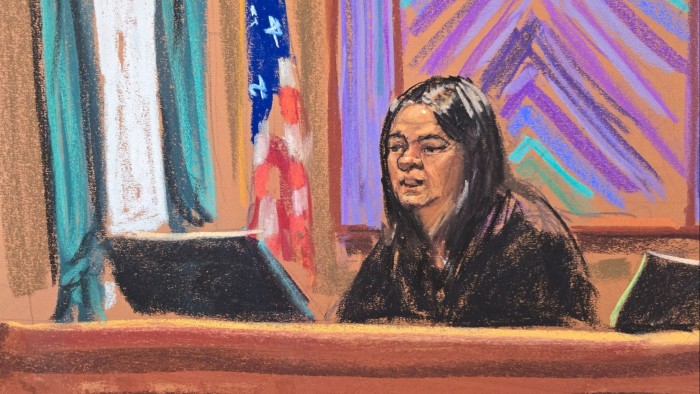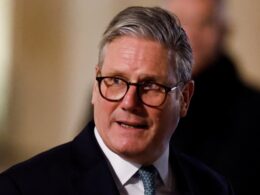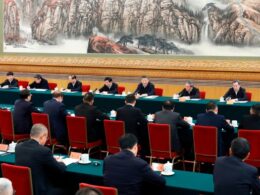In a New York court on Friday, Donald Trump and billionaire ally Elon Musk suffered another setback to their plan to overhaul the US government by sacking workers, slashing spending, and dismantling the bureaucracy of the world’s most powerful economy.
Judge Jeannette Vargas extended an order denying Musk access to the Treasury system that disburses trillions of dollars in payments.
The ruling was the latest evidence that the biggest check to Trump and his executive power is not Congress or the Democratic party, but America’s courts.
“The only institutional backstop is the courts,” said Noah Bookbinder, president of Citizens for Responsibility and Ethics in Washington, an advocacy group that has sued the Trump administration over plans to fire government workers.
“The response from Congress has been pretty anaemic . . . [If] it doesn’t respond to its oversight and its laws and its spending being disregarded, it’s going to give away all of its power and not have much ability to actually perform its constitutional role, which is crucial to our system of checks and balances.”
The US constitution gives the president wide powers. But it also gives Congress much authority, especially over raising public money and spending it, and entrusts the courts to enforce the limits on the other two parts of government.
Yet the blizzard of executive orders issued by Trump since taking office has included several relating to spending, or not spending, money appropriated by legislation in Congress.
Republican lawmakers have barely commented on these moves, in contrast to lawyers and judges.
A federal judge in Rhode Island last week ordered the administration to lift a freeze on payments to the country’s top medical research institute and to clean energy projects, describing plans to block federal funding as “likely unconstitutional”.
These rulings are troubling Trump enough that he and his allies are now moving to undermine the very principle of judicial oversight of the executive — claiming it could compromise democracy itself.
“He who saves his Country does not violate any Law,” Trump posted on Truth Social on Saturday.
“If ANY judge ANYWHERE can stop EVERY Presidential action EVERYWHERE, we do NOT live in a democracy,” Musk wrote in a post on X on Thursday.

Courts are especially critical, legal experts say, in light of the Trump administration’s assault on other forms of oversight. These include the civil service, which is being pummelled by budget cuts and attempts to shut down regulators, and independent watchdogs, such as federal agencies’ inspectors-general, more than a dozen of whom have been fired.
Some lawyers are now stepping up.
A string of Manhattan’s top prosecutors, including Danielle Sassoon, the Trump-appointed acting US attorney for the powerful Southern District of New York, last week quit following an order from the government to drop the corruption prosecution of New York City mayor Eric Adams.
Only “someone who is enough of a fool, or enough of a coward” would move to dismiss these criminal charges, Hagan Scotten, SDNY’s assistant US attorney, wrote in a withering resignation letter unveiled on Friday.
Some lawsuits challenging Trump’s measures may make their way to the Supreme Court, which is split 6-3 between conservative and liberal justices after he appointed three right-leaning justices during his first term. And the Trump administration itself has already asked the top court to overturn a judge’s order preventing it from removing Hampton Dellinger as head of the Office of Special Counsel, an agency that protects government whistleblowers.
The Supreme Court in recent years has been accused of partisanship, as some of its most controversial decisions have been split along ideological lines. In one such opinion last year, the conservative majority granted Trump broad immunity from criminal prosecution for his actions as president, raising critical questions of presidential accountability.
But legal experts argue Trump’s administration may still lose before the Supreme Court if, for instance, it hears the case challenging a plan to limit birthright citizenship. US states and advocacy groups that have sued the government argue it violates the constitution’s 14th amendment, which says all “persons born or naturalised in the US . . . are citizens of the United States”.
The bigger unknown would be if the president refused to follow court orders. This could prompt a constitutional crisis of the likes not seen since the Civil War, when Abraham Lincoln disregarded a Supreme Court order that barred detaining individuals without warrant.
Courts may in that case order contempt on government officials, said Gillian Metzger, professor of constitutional law at Columbia Law School, although she added such a course was “extraordinarily rare” and would raise further questions on whether they would comply.
The Rhode Island judge last Monday said evidence showed the government continued to withhold certain federal funds in violation of a previous order. The finding raised questions over whether US courts can ensure the Trump administration adheres to their rulings. The government said it sought to follow the judge’s directive and blamed clunky payments systems.
Trump’s Make America Great Again movement might feel liberated by a judiciary that holds no sway over the executive, said Aziz Huq, professor at the University of Chicago Law School.
“But what it also does is it liberates everybody else. Why should a governor, why should a state court judge . . . why should anybody listen to the legal opinion of either the Supreme Court or the president?”
“It’s not that you open the door to unilateral claims of power by the president, it’s that you open the door to a cacophony of voices rather than a single voice settling what the law says,” he added.
“I don’t think anyone knows what that looks like. But I don’t think it’s what the people on the Maga right think it looks like”.
Source link









